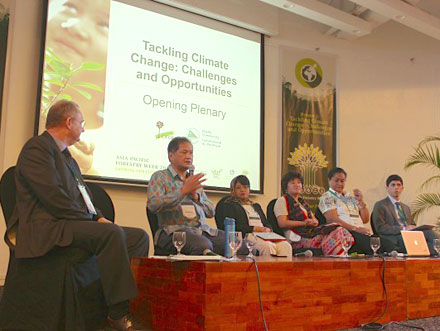
The Center for International Forestry Research (CIFOR) opened its ‘Climate Change’ program at the Asia Pacific Forestry Week (APFW) 2016, in Clark Freeport Zone, Pampanga, Philippines. Source: Cifor
The event is the first opportunity since the historic Paris Agreement to explore how the new climate agenda is relevant to forest management in the Asia-Pacific, and how forest management in the region can support the new agenda, for the benefit of forests and people in the region and globally.
“Now that the dust has settled on the Paris climate change conference, countries around the world are regrouping to see how they can translate the lofty commitments made in Paris into practical action on the ground,” said Patrick Durst, senior forestry officer for the Food and Agriculture Organization of the United Nations (FAO).
At the ‘Tackling Climate Change’ Opening Plenary, Tony La Viña, UNFCCC negotiator for the Philippines and Dean of Ateneo School of Government said: “Paris was and is the best possible agreement that 196 countries could agree to. Now we must put into the place the things that have to be done, to decisively address climate change once and for all.”
Joining Tony La Viña on the ‘Tackling Climate Change’ opening panel was Nur Masripatin, Indonesia’s Director of Climate Change Management at the Ministry of Environment & Forestry, Joan Carling, Secretary General of the Asia Indigenous Peoples Pact, Christine Fung, Land Use Planning and Facilitation Specialist/Deputy Team Leader at the Pacific Community/GIZ, and Juan Chang, Senior Forestry and Land Use Specialist at the Green Climate Fund.
Focusing on REDD+, Juan Chang touched on the need to move ahead with operationalising results-based payments, while Nur Masripatin spoke of Indonesia’s priority to resolve implementation challenges, including strengthening monitoring, verification and reporting systems.
Christine Fung highlighted the importance of non-carbon benefits for communities in the Pacific Island countries, with Joan Carling referring to improvements to livelihoods, food security and the protection and enhancement of cultural values as broader objectives.
On climate change adaptation, Carling also emphasized the role of indigenous knowledge in offering powerful contributions to adaptation, drawing on the centuries-long traditional practices of Indigenous Peoples across Asia.





